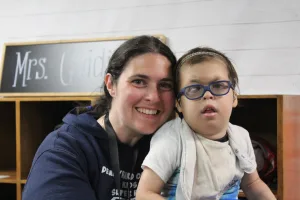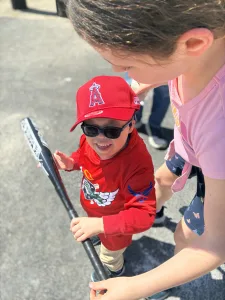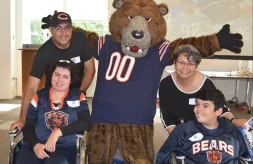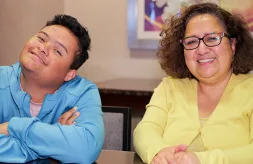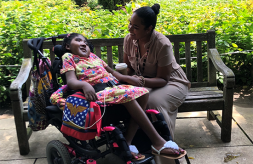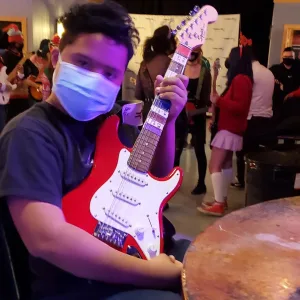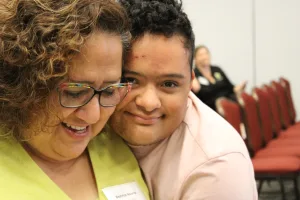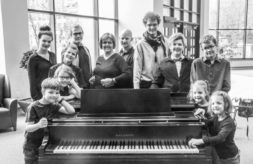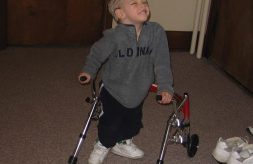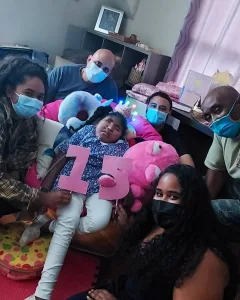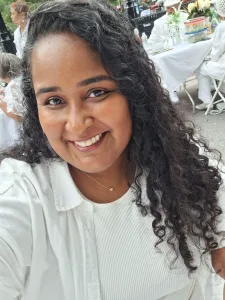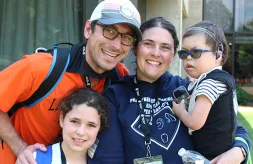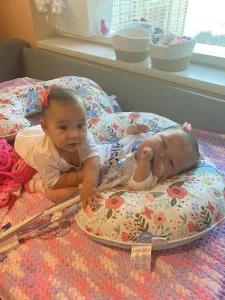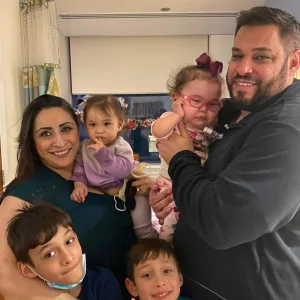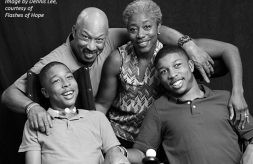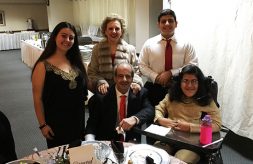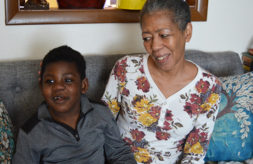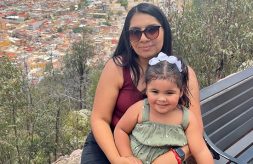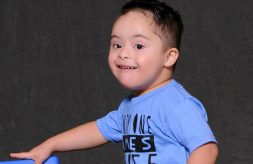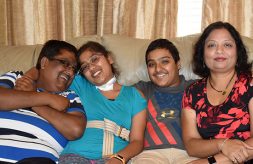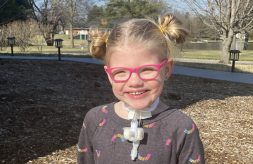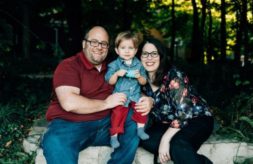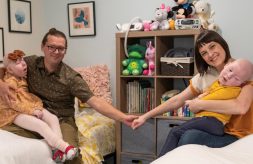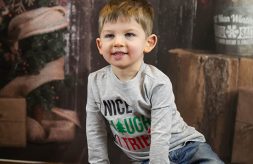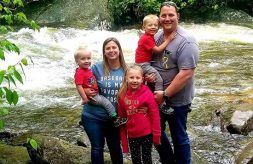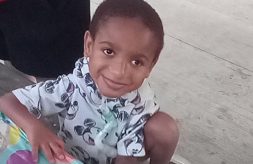The O’Brien Family
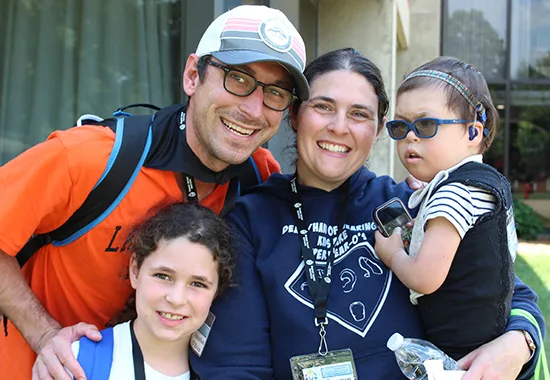
“It's always been we don't know if he will walk. We don't know if he will talk. So, we just keep following up with all 17 specialists and we keep pushing him to be the best he can be.”
— Lauren O’Brien, Josiah’s mom
“I think it’s all about having as many advocates in your corner.”
We sat down for a conversation with the O’Brien family at the 2024 Institute for Parents of Preschool Children Who Are Deaf or Hard of Hearing in Jacksonville, Ill. The Institute is a free multi-day program for parents of children ages 6 and under who have hearing loss. It takes place annually in June at the Illinois School for the Deaf (ISD).
The Division of Specialized Care for Children (DSCC) helps sponsor this annual event.
Lauren, Jonathan, Alannah (7), and Josiah (4) drove to the Institute from their hometown of Aurora, Ill.
“We still talk about that weekend all the time. It was one of the best weekends of our lives,” Lauren said later about the experience.
Something for everyone
The family of four each had a unique experience at the Institute, enjoying the different programming and activities.
Josiah has a genetic deletion on chromosome 15. He is globally delayed with a bilateral hearing loss.
He spent his time at the Institute playing and learning in a classroom with other children who are deaf or hard of hearing. He also received hearing, psychological, speech, language and educational evaluations.
Alannah participated in the sibling program, where she took American Sign Language (ASL) classes and enjoyed camp-like activities with other siblings of children who are deaf or hard of hearing.
While their kids were busy in class, Jonathan and Lauren attended daily lectures to learn more about raising a child with hearing loss.
“There are a lot of opportunities for us to be able to help him develop and grow,” said Jonathan.
Making great strides
Josiah continues to reach new milestones.
He started walking at 4 years old. Alannah, a proud big sister, told us about his first steps.
“He just took seven steps at his school and then at the mall, he took 118 steps,” shared Alannah.
“He pretty much let go of his walker and he’s been wanting to run ever since,” added his mom, Lauren.
Josiah is on the move. He started tee ball this year and went to his first mother/son dance.
“It’s always been we don’t know if he will walk. We don’t know if he will talk. So, we just keep following up with all 17 specialists and we keep pushing him to be the best he can be,” says Lauren.
“A resource that can give you all the resources.”
Part of Josiah’s support team includes DSCC Care Coordinator Kevin Winkfield.
Lauren says she appreciates Kevin’s care coordination and the value of his consistent communication.
“Having the Care Coordinator to at least bounce ideas off of and having him check in on our family and say, ‘How’s Josiah doing? Any great gains in therapy? What are you looking at? What are his short-term goals? What are his long-term goals?’ Just helping with any ideas of the special needs side that we don’t know – the resources that are out there for us that we wouldn’t know about without getting in contact with DSCC,” Lauren said.
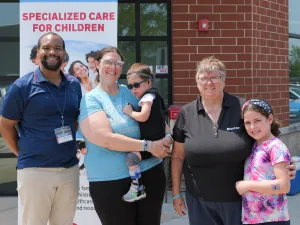
Care Coordinator Kevin Winkfield (left) poses with Lauren, Josiah, the children’s grandma, and Alannah at our Mokena Regional Office. The O’Briens enjoyed Mokena’s annual Summer Extravaganza in July 2024.
Jonathan echos Lauren’s appreciation.
“I think it’s all about having as many advocates in your corner, right? And I think DSCC will provide those and we’re super grateful for them,” added Jonathan.
When asked how she would describe DSCC to another family, Lauren said, “They’re a resource that can give you all the resources.”
Lauren continues to share information about DSCC and the Institute with other families in her community.
“We love spreading the word about DSCC and ISD,” she said.
For more details about the Institute and a full list of sponsors, visit https://dscc.uic.edu/events/2025-institute-for-parents-of-preschool-children-who-are-deaf-or-hard-of-hearing/.
Eli’s Family Story
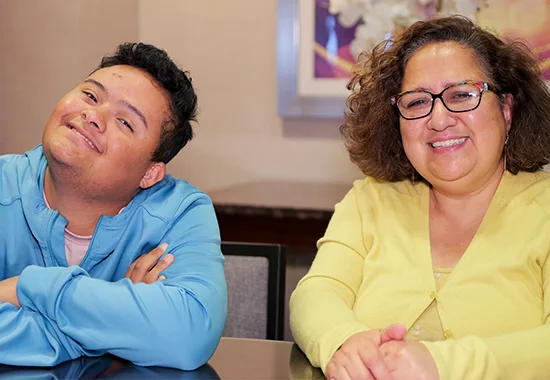
“The way he writes is so profound that he will never speak that way, but it comes out in the music, and I’m just blown away by it.”
— Beatrice Alvarez, Eli's mom
“My dreams for him are that he continues to advocate for himself”
Eli Alvarez is passionate about music and has big dreams to pursue this passion.
At 18 years old, he is off to a great start, with several original songs and performances under his belt.
Eli loves country music and is inspired by one country artist in particular.
“Luke Combs, he’s a songwriter… He sings a lot of cool songs. He has a group, and I want to be like him,” Eli said.
Eli’s mom, Beatrice, supports his dream 100%.
“It comes out in the music.”
“I was, in a previous life, an opera singer, and I do play music. So, one of the ways I got to tap into Eli and help him early on to read, as a matter of fact, was through music,” Beatrice said.
“And he started reading at about 4 years old, and granted, this is a kid with multiple diagnoses. He’s autistic, he has Down syndrome, he has anxiety disorder, he has a bunch of other labels. And the music was a way to tap into him learning to read. And then the writing came afterward,” she continued.
“Had I not tapped into that, we might have missed this absolute passion of his to write music. And the way he writes is so profound that he will never speak that way, but it comes out in the music, and I’m just blown away by it.”
Now that Eli is becoming an adult, he’s planning for his future and how to share his original music with the world. Beatrice wants to help him achieve his goals and highest level of independence.
The University of Illinois Chicago’s Division of Specialized Care for Children (DSCC) is an essential partner in helping the Alvarez family navigate the crucial transition to adulthood.
“It’s scary,” Beatrice said of the transition. “Even the IEP (Individualized Education Program) is not the typical IEP anymore. It’s still an IEP, but it’s also about, ‘Oh, what do you want to do with your future?’”
Eli’s DSCC Care Coordinator regularly checks in with Beatrice and Eli and is a valuable sounding board. She’s helped connect them with funding sources for Eli’s hearing aids. She also helps troubleshoot gaps or issues with Eli’s care and find appropriate resources.
“It’s a really good relationship. I feel that I can reach out to her whenever I need to, and I’m grateful for that,” Beatrice said.
To help with Eli’s transition planning, their Care Coordinator recommended the Illinois Statewide Transition Conference. The conference provides valuable resources and information to help youth with disabilities and their families prepare for adulthood.
DSCC covered all the related costs for Eli and Beatrice to attend the 2024 transition conference in Springfield.
Eli made new friends and shared his love for songwriting. He even booked a gig to perform for The Arc of Illinois.
Beatrice learned more about key services and programs and connected with other professionals and family members.
“I got the answers I needed, or at least I got the direction I needed,” she said.
“If he’s able to do it, then do it.”
Beatrice says she wants to empower Eli to take the lead in his future.
“I used to say when he was very little, ‘Oh, he’s going to live with me my whole life.’ And my dear friend said, ‘You better stop saying that because I’m going to call you out.’ And I’m glad she said that. I am now saying, ‘Well, you lead, kiddo,’” Beatrice said.
Eli, in turn, enjoys taking the lead.
Once he decided to pursue songwriting, he worked on his own to find a music arranger and free sound mixing programs. He now uses Google Docs to organize all the music and lyrics he used to write on paper.
Eli has written five original songs, including the ballad “Hopeful Smile,” which he wrote for his girlfriend. Eli and Beatrice recently performed “Hopeful Smile” during an outdoor concert at the Berwyn Market in Chicago.
“Other people like to listen to my songs,” Eli said.
He also hopes to move to California with his girlfriend.
“I would say my dreams for him are that he continues to advocate for himself and preparing for the time when I’m no longer able to or here with him to do it,” Beatrice said.
“I don’t want people to… what I call it, disabling the disabled. If he’s able to do it, then do it and to have the dignity of risk to do it. So, being able to fail and learn from that and be OK.”
Davina’s Family Story
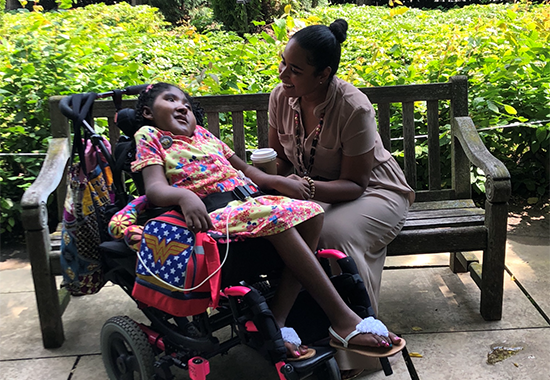
“I’m trying to make sense of the journey and all of the struggles and use those experiences to move me forward and to help others move forward.”
— Ekiko “Yesenia” Aiken, mom of Davina
“She wasn’t a burden, she was my kid, and I’d do it all again.”
Ekiko “Yesenia” Aiken’s pregnancy with her daughter, Davina, was smooth and without complications. But when Davina had a seizure immediately after birth, a flurry of diagnostic tests followed.
As different diagnoses came back, Yesenia said she became a “fast advocate.”
“Her original prognosis was 30 days, and we took her home on a hospice plan… they were pretty much like, ‘Take her home, love on her and maximize the time you have with her,’” Yesenia recalled.
“From the moment she was born, everything that they gave me as far as diagnoses, I came back with, ‘Well, that’s not the final or definitive answer to what that means for her life.’ So, I advocated right away.”
Once home, Yesenia continued to relentlessly advocate for Davina and find a way to meet her medical needs while ensuring the best quality of life.
“It was just finding a way when no one was giving me any options – pressing them and finding a way. That became essentially the way we did things for the next 16 years. That’s how she made it to 16 years,” Yesenia said.
When Davina passed away at 16 in December 2022, Yesenia’s advocacy didn’t stop. She wanted to use what she learned to help other families.
One way Yesenia continues her advocacy is through our Family Advisory Council (FAC). Yesenia joined the council as a bereaved parent member in 2023.
“It really helped me to sort of pick that baton back up and feel connected to Davina and feel like that energy and drive and momentum could benefit someone else other than just our family,” Yesenia said.
“We were the perfect fit.”
Davina was born in Georgia and eventually diagnosed with Aicardi syndrome, a rare genetic disorder that affects the brain and eyes as well as other parts of the body. It caused seizures, vision problems, spinal defects and other developmental delays.
When Davina was young, Yesenia became a single parent. There were multiple hospitalizations and surgeries to repair Davina’s scoliosis. Yesenia also worked to find the proper medications to manage Davina’s seizures and a nutrition plan to help Davina gain weight.
Yesenia began her bachelor’s degree studies as a psychology major and completed her degree in English – creative writing. She credits those early studies as formative in her knowledge of the brain and understanding that “malformation doesn’t determine what type of malfunctions happen.”
Therefore, as she learned of Davina’s impairments, Yesenia was determined to see how Davina would actually develop before assuming what her daughter was capable of.
Yesenia said she was never afraid to ask questions and consider all options. Ultimately, she would make decisions that fit Davina’s and her lifestyle.
“I would always inquire about everything and get as much information as I could get, but then I would narrow it down to what’s important to us, what maintains Davina’s quality of life, and what keeps her happy while maintaining my sanity, and not feeling guilty for that balance,” she said.
Davina developed a passion for music, with a special love for classical and jazz. She also was a social butterfly with other kids and always ready for an adventure.
“She was a very comforting spirit and was very calming and soothing to be around,” Yesenia said. “We were the perfect fit… she was the biggest blessing, and I enjoyed being there for her. I enjoyed all the care and the challenges, too. She wasn’t a burden, she was my kid, and I’d do it all again.”
When Davina was 11, Yesenia decided to move back to her native Evanston so they could be closer to family and give Davina more educational opportunities.
After the move, Yesenia learned about DSCC from other families she met through their Aicardi syndrome connection.
Davina thrived at school in Evanston, but finding available at-home nursing was challenging. Yesenia worked closely with her DSCC Care Coordinators to try to find the right services for Davina’s level of care.
When the pandemic hit in 2020, the change in school and therapy routines affected Davina’s overall health. Yesenia said her DSCC Care Coordinator at the time worked hard to help the family try to bridge the gaps.
“A lifeline”
After Davina passed away, her Care Coordinator asked Yesenia if she would consider joining DSCC’s Family Advisory Council whenever she felt ready.
“I was really grateful that she presented it and was very respectful with how she presented it. She phrased it as, ‘I don’t want you to feel overwhelmed or burdened and don’t feel any obligation, but I really think this would be a good place for you to help continue to advocate,’” Yesenia said.
“Honestly, for me, (the FAC) was kind of like a lifeline. In that moment when you’re going through so much and there’s so much going on around and the grief has not quite settled in, it’s kind of like a line that keeps you connected.”
When Yesenia attended her first meeting, she was immediately impressed by the other parents’ passion, knowledge and diverse backgrounds.
“Everyone brings something different to the table, but the fact there are several parents who have taken on full-time jobs in respective organizations and brought what they get from those organizations to the table. It was really impressive to see parents being so involved,” she said.
A future in advocacy
As an FAC member, Yesenia said she’s excited to contribute to its newly formed transportation committee, which is looking at the challenges families face in transporting their children to medical appointments, hospitals, therapies, etc., all over Illinois.
Yesenia said it’s refreshing to meet and know other families who are fighting just as hard for their kids. She also explained that her connection to other families and the world of caregiving is still vitally important to her identity after losing Davina.
Yesenia also wants to honor and continue sharing what Davina taught her throughout her 16 years.
“It wasn’t for me to go through, get through and then leave it alone once it was done,” Yesenia explained.
“She basically gave me a foundation for a future in advocacy, and she was essentially sort of the fuel to say, ‘This is not where it stops. You’ve gained so much in this experience; move forward with what you have, and don’t leave it alone.’
So that’s what I’m trying to do now. I’m trying to make sense of the journey and all of the struggles and use those experiences to move me forward and to help others move forward.”
The Vasquez Family
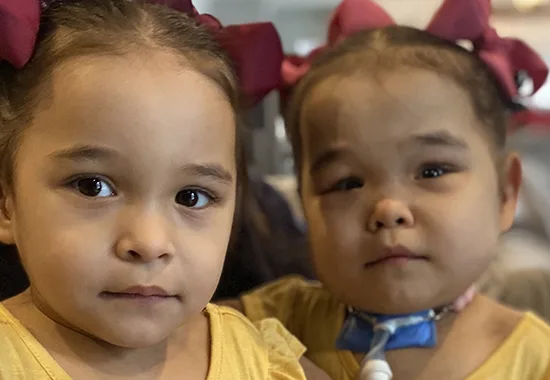
“There’s so much conversation about the village that raises the child. If you need a whole village to raise a typically developing child, what are we doing for those that need additional support, especially in children like ours that are technologically dependent?”
— Jaclyn Vasquez, mom of twins Ava and Oliva
“We need to have our voices heard”
In April of 2020, Jaclyn Vasquez was a busy mom of two little boys in her 40s. She soon found out she was pregnant with identical twin girls.
It was a hard, high-risk pregnancy made even more difficult by the isolation, health risks and unknowns of the COVID-19 pandemic.
With an extensive professional background in early childhood development, Jaclyn successfully advocated for her own health and for her twins to stay in the womb as long as possible.
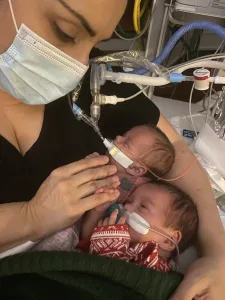
Jaclyn Vasquez holding her “micro-preemie” twin daughters, Ava and Olivia, when they were in the neonatal intensive care unit.
Jaclyn delivered Ava and Olivia at 27 weeks and five days. She suddenly became the mother of “micro-preemies” fighting for their lives. It was the beginning of a rollercoaster journey that led her to DSCC and our Family Advisory Council.
Jaclyn and her husband juggled caring for their two boys at home and being in the neonatal intensive care unit (NICU) with their daughters.
Olivia spent 100 days in the NICU. Ava struggled more with severe lung damage due to her prematurity.
Ava transitioned to Ann and Robert H. Lurie Children’s Hospital in Chicago. She received a tracheostomy tube (trach) and gastrostomy tube (g-tube) just before she turned 4 months old. Ava spent a total of 586 days – 19 months – in the hospital before she was stable and strong enough to come home.
Ava immediately enrolled in the Home Care Program, which DSCC runs on behalf of the Illinois Department of Healthcare and Family Services.
Jaclyn and her family then began to experience the systems and challenges involved with caring for a child who is medically complex at home. These challenges include a shortage of qualified nurses to provide in-home care and a lack of community awareness across the board about what children like Ava need.
“This a population where we’re so overwhelmed and there’s so much going on and there’s so much scary, and not many people know about us or how to support us, even society in general,” Jaclyn said.
Jaclyn soon found DSCC’s Family Advisory Council (FAC) and wanted to learn more.
“We talk about the typically developing child and there’s so much conversation about the village that raises the child. If you need a whole village to raise a typically developing child, what are we doing for those that need additional support, especially in children like ours that are technologically dependent?” Jaclyn said.
“I saw the FAC as a platform specifically for our population to continue to elevate our voice and understand what’s going on in the state, where we can continue to advocate and promote policy changes and also as another way to build community,” Jaclyn said. “Especially during COVID when the girls were born. I didn’t get to meet other families who were experiencing something similar or had older children who went through it who I could learn from. I just felt it was a good place to be.”
Jaclyn joined the council and is now able to share both her experience as a parent and caregiver as well as her professional expertise. She is a former early childhood special education bilingual educator and administrator for the Child Parent Centers across Chicago Public Schools. She also served as the co-director of Policy and Leadership at the Erikson Institute.
Jaclyn now cares for Ava, 4, full-time and runs her own consulting company focused on early childhood development, community systems and policy.
“I understand where these are possibilities of intersection to create space for information, awareness, center family voices in the conversation but also raise those voices to other tables and where we need to have our voices heard,” she said.
Jaclyn says she also appreciates how the FAC is a committee that is responsive to its members.
In the fall of 2023, she volunteered to join Erica Stearns as the FAC’s co-chair. In her new leadership role, she hopes to look at ways to use both data and family voices to make meaningful differences in real time.
“It really is a great space for us to connect with others and not feel so alone on our path to support our own children,” Jaclyn said.
“I also think it’s a great place to learn about what else is happening across our state that could be A., either a possible resource, or B., where we can continue to elevate our voice to create changes not just for our own children but for other children as this population is growing.”
The Barraza Family
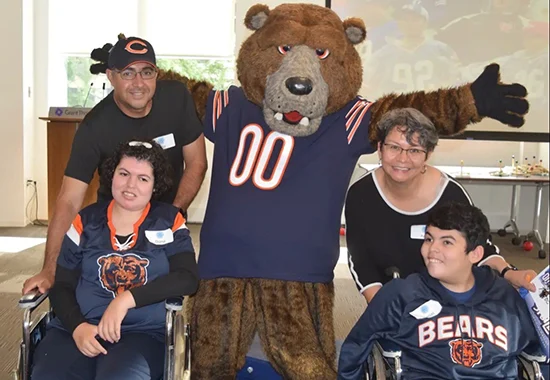
“(DSCC Care Coordinator) Ariel is wonderful. She’s very understanding and good about following up and helping provide financial support.”
— Anita Barraza, mother to Daniel and Diana
“As a parent, we can feel so overwhelmed. Even if help is right there, that reach can be hard to do.”
Daniel Barraza, 17, and his big sister, Diana, 22, were born with the same rare condition. Yet, it took many years before their family knew their true diagnosis.
Doctors first thought the siblings had cerebral palsy with hypotonia and seizure disorders. Hypotonia means decreased muscle tone, so Daniel and Diana have a hard time sitting up, holding their head and body upright, and so on.
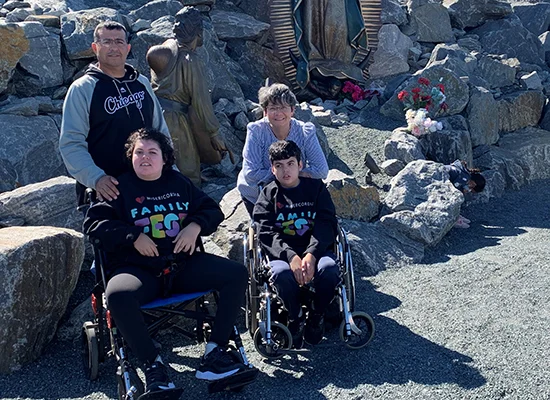
Both siblings enrolled with the Division of Specialized Care for Children (DSCC) shortly after they were born. (Diana recently aged out of DSCC’s Core Program after turning 22.)
In 2017, genetic testing revealed they both have a rare gene mutation called GPAA1. The Barrazas first knew of only a handful of families living with this syndrome worldwide, their mom, Anita said. They’ve learned of a few more families affected by GPAA1 since then.
The official diagnosis was initially difficult for Anita.
“It caused a lot of mixed emotions,” she said. “It was another phase of the grieving process you go through as a parent and a reminder of what’s wrong.”
Now, she focuses on her children’s abilities and helping them have the best quality of life possible.
She is thankful for the support DSCC provides to help maximize her children’s strengths, navigate their needs and connect with resources as they grow.
“(DSCC Care Coordinator) Ariel is wonderful. She’s very understanding and good about following up and helping provide financial support,” Anita said.
“DSCC, The Arc of Illinois and DRS (Division of Rehabilitation Services) have been wonderful for our family.”
“Engaging them is what matters”
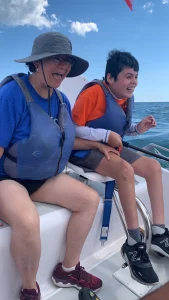
The Barrazas prioritize being active. They enjoy camping together and have traveled to Yellowstone, Mount Rushmore, Starved Rock and more.
The family is always on the lookout for accessible sites for Daniel and Diana’s wheelchairs. The siblings have also participated in the Special Olympics Illinois Summer Games.
“Seeing them active and engaging them is what matters to me most,” Anita said.
The family also wants to empower Daniel and Diana to be as independent as possible. They also want to help others understand their abilities.
Anita likes to make videos showing Daniel and Diana doing a variety of activities, such as preparing food, doing chores, playing sports and having fun outdoors.
“Since my children are non-verbal, this is a good way for people to know what they are capable of doing,” she said. “I encourage other parents to make them!”
Anita shares these videos with teachers, camp counselors, recreational program staff and more.
“A lot of times, we focus on the ‘cannot do’ and it limits our ability to see what they can do,” she said.
You can watch these videos below:
“Education empowers me”
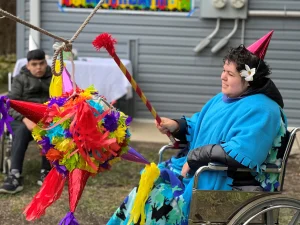 As an occupational therapist who works with schoolchildren, Anita understands both sides of the need for information and resources when supporting young adults with disabilities.
As an occupational therapist who works with schoolchildren, Anita understands both sides of the need for information and resources when supporting young adults with disabilities.
“As a parent, we can feel so overwhelmed. Even if help is right there, that reach can be hard to do,” she said.
Anita was grateful DSCC arranged for her family to attend the Illinois Statewide Transition Conference together. The conference helps families and professionals learn about the resources, information and opportunities available for youth with disabilities as they prepare for adulthood.
DSCC covered all the related conference costs. The conference was a valuable networking opportunity for the Barrazas.
“These types of resources educate me on how to best provide for my children’s needs and for their future,” Anita said.
Both Daniel and Diana are unable to safely live on their own due to their significant medical needs.
Anita says it’s hard to think about, but she realizes she must start planning for who can care for them when she and her husband can no longer do it. Residential placement may be necessary in the future.
She appreciates DSCC’s role in helping families prepare and outline goals for their child’s future. Families can never have enough information and resources, Anita said.
“Education empowers me to be better prepared to help (Diana and Daniel) have a good quality of life.”
Eloise’s Family Story
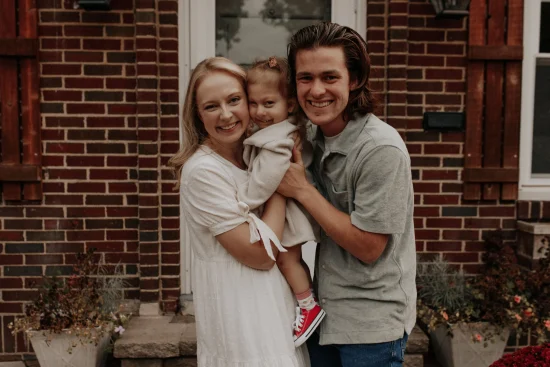
“I’m grateful for the team that we have surrounding us… How else would we have gotten here?”
— Eloise's mom, Rachel
“It takes a village, and you need to find your village.”
Rachel Singleton has faced many frightening unknowns throughout her daughter Eloise’s life.
At 20 weeks pregnant, Rachel learned Eloise has a rare brain malformation called alobar holoprosencephaly. The condition causes a developing baby’s brain to not properly separate into the right and left hemispheres (halves).
At first, Rachel and her husband, Zach, didn’t know if Eloise would survive birth. Once Eloise was born in November 2019, they didn’t know how long she would live. Her life expectancy was six months or less.
The new parents also didn’t know how much they would gain. Understanding doctors. The generosity of family and friends. And caring professionals from the Division of Specialized Care for Children (DSCC).
Rachel credits this support team with helping Eloise and her family reach her 3rd birthday.
“This has been three years we didn’t know that we would get,” Rachel said. “I’m grateful for the team that we have surrounding us… How else would we have gotten here?”
Help from a “jack-of-all-trades”
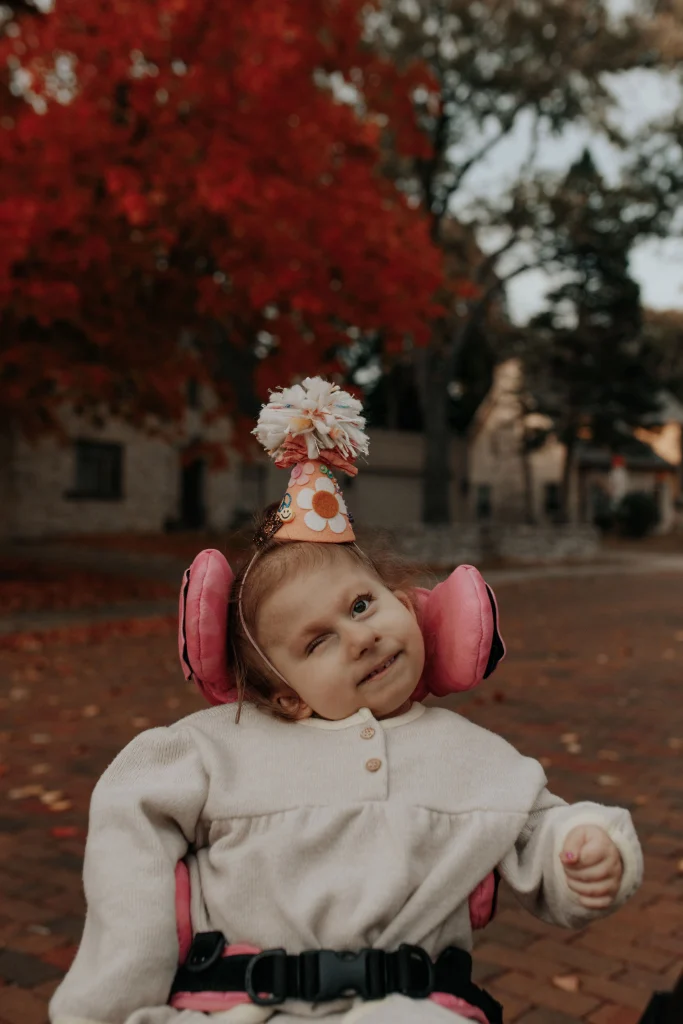 Immediately after her birth, Eloise spent 20 days in the neonatal intensive care unit at OSF Children’s Hospital of Illinois. She then went home to hospice care just before the COVID-19 pandemic hit.
Immediately after her birth, Eloise spent 20 days in the neonatal intensive care unit at OSF Children’s Hospital of Illinois. She then went home to hospice care just before the COVID-19 pandemic hit.
Early on, her family contacted DSCC. Care Coordinator Haley Shropshire helped them navigate many new and unfamiliar challenges.
“That first year we learned to do a lot on our own but when we needed additional nursing help, Haley and the team at DSCC helped us sort through insurance and get Eloise’s needs met,” Rachel said. “Haley is a jack-of-all-trades, and we’re so thankful for all that she does.”
Eloise has since moved from hospice to palliative care and continues to defy the odds.
Her middle name is Joy and that’s exactly what she brings to all who meet her, Rachel said.
“She has the biggest smile and hair that can’t be tamed. She’s a charming warrior – feisty, sweet and sassy.”
The family was overjoyed to celebrate Eloise’s third birthday. They used the occasion to give back to OSF Children’s Hospital with a donation of sound machines and other special treats and gifts for the hospital’s patients and staff.
“The party was a way to give back and celebrate something we never dreamed possible,” Rachel said.
“It takes a village”
Along with the joy, there are still immense challenges in caring for Eloise’s complex medical needs.
“You can feel like you’re drowning. Some days it feels impossible,” Rachel said. “It takes a village, and you need to find your village.”
Rachel is thankful to have Haley and DSCC as part of her village.
If a need comes up, “she’s the first person I go to, and I can count on her to look into something,” Rachel said, whether it’s glasses for Eloise, new equipment or an insurance question.
“So far, there’s no question that she hasn’t been able to answer,” she said.
Rachel also appreciates how Haley takes the time to really talk with her during their monthly check-in calls.
“I get so many calls for Eloise, and I have to go through things as quickly as possible. With Haley’s calls, there’s time to chat. I don’t have to just run through everything,” she said.
Eloise now has an Individualized Education Program (IEP) and may start preschool soon.
Rachel also started a blog called Eloise’s Mom to help other medical moms and families feel less alone. She also hopes to educate others about the grief and happiness that come with raising a child with medical complexity.
“The ‘loss of normal parenthood’ has taken on different meanings over time,” Rachel wrote in one post. “I no longer grieve experiences. I have sort of allowed myself to dream again. But the anticipatory grief lingers. And that’s okay.”
You can read more about Rachel and Eloise’s powerful story at https://eloisesmom.com/.
Dominic’s Family Story
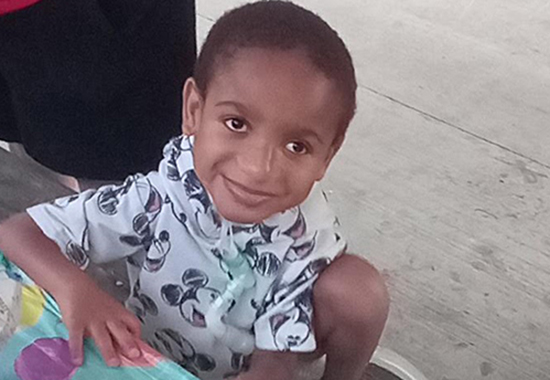
“It’s been a pretty easy program to work with. All of my case managers have been extremely helpful.”
— Aurea, mother of Dominic in the Home Care Program
“The tunnel can be very long, but there’s light at the end of it.”
Dominic’s mom, Aurea, felt like she lived at the hospital during the first years of her son’s life.
“Everybody joked that I was an honorary staff member,” she recalled of the many and long hospital stays.
Dominic, now 7, was born with a large omphalocele. Omphalocele is a rare condition at birth that affects the abdominal (belly) wall. It caused his intestines, liver and bowels to stick outside of his belly in a sac through his belly button.
Aurea said the omphalocele’s size prevented his lungs and chest wall from fully developing.
“Initially, he didn’t really need that much respiratory support. But as he started growing, he needed more oxygen,” she said.
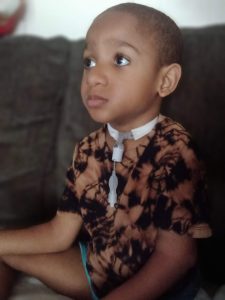 Dominic soon got sick with pneumonia and was placed on a ventilator. He was able to get off the vent, but his chest wall was too small to support his breathing needs.
Dominic soon got sick with pneumonia and was placed on a ventilator. He was able to get off the vent, but his chest wall was too small to support his breathing needs.
“They did a chest surgery when he was 6 months old. They cut his ribs to give his lungs a chance to grow and give more respiratory capacity,” Aurea said. “(His condition) has not been a linear thing. It’s definitely a little up, a little down. It’s all trying to figure out what works best.”
Through the highs and lows, the University of Illinois Chicago’s Division of Specialized Care for Children (DSCC) has helped Aurea and her family navigate Dominic’s changing needs over the last seven years.
“It’s been a pretty easy program to work with,” Aurea said. “All of my case managers have been extremely helpful.”
Dominic and his family receive in-home nursing through the Home Care Program. DSCC operates the Home Care Program on behalf of the Illinois Department of Healthcare and Family Services (HFS).
Dominic has a tracheostomy and a vent. His home must meet certain requirements to support his ventilation equipment.
Aurea said Dominic was in the hospital so long that her family didn’t renew the lease on their home and stayed with her parents. When preparing for Dominic to leave the hospital, they had to find a house with grounded outlets.
A friend of Aurea’s family is an electrician and was able to ground their home’s outlets before Dominic arrived home. Dominic’s DSCC Care Coordinator at the time helped their family with the necessary paperwork to pay for the electric work and complete the home inspection.
Once Dominic was home, Aurea grew frustrated with Domonic’s local care. Dominic’s Care Coordinator helped her find pulmonologists used by other DSCC participant families and move Dominic’s pulmonary care to Ann and Robert H. Lurie Children’s Hospital.
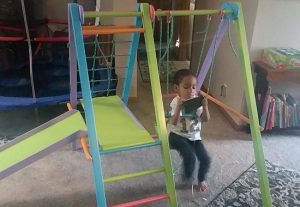 “That was really helpful and made it very easy to switch,” Aurea said.
“That was really helpful and made it very easy to switch,” Aurea said.
Dominic’s current Care Coordinator, Julie Gosnell, is now working with Aurea to find a cart that can easily carry his vent beside him while he’s on the go outdoors.
“He’s very active. He runs up and down the hallway all of the time, jumps on the bed, jumps on the couch. He loves jumping on whatever he can jump on,” Aurea said. “He just loves to climb on things. I tell people he’s a regular little boy, he just has extra tubes.”
Julie has helped Aurea apply for the Health Insurance Premium Payment (HIPP) Program and compile Dominic’s medical records to share when seeking a second opinion.
Aurea also partners with Julie to focus on goals for Dominic and his future.
“My ultimate goal is for him to be done with all of those machines – no oxygen, no trach, no g-tube (gastrostomy tube). But I realize that goal to ultimately get him off machines is not a goal that I can attain. I can’t do anything to make that happen,” Aurea said.
“I can make sure that I am on top of his medical care and making sure he gets what he needs, whether that’s joining Facebook groups or Google searching or finding things out about different techniques… I want to do what I can to improve Dominic’s quality of life.”
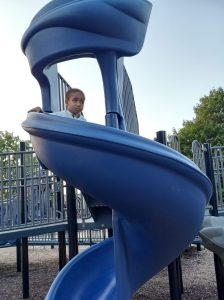 Although she is an independent person, Aurea said she appreciates having a team to contact when problems occur, she has a question or she just feels overwhelmed.
Although she is an independent person, Aurea said she appreciates having a team to contact when problems occur, she has a question or she just feels overwhelmed.
“It’s nice to have someone follow up with me consistently,” she said. “It’s nice to speak with Julie, and she can give me ideas for doing something differently.”
Aurea has also joined DSCC’s Family Advisory Council (FAC).
“I’ve always felt with this journey in general is if I can to anything to help somebody else along the way, I’m going to do that, whether it’s having a conversation or sharing some of the hiccups in a program I’ve seen,” she said.
Aurea recommends that families of children with medical complexity focus on what they can control and celebrate the small victories.
“There is light at the end of the tunnel. The tunnel can be very long, but there’s light at the end of it,” she said.
Lisette’s Family Story
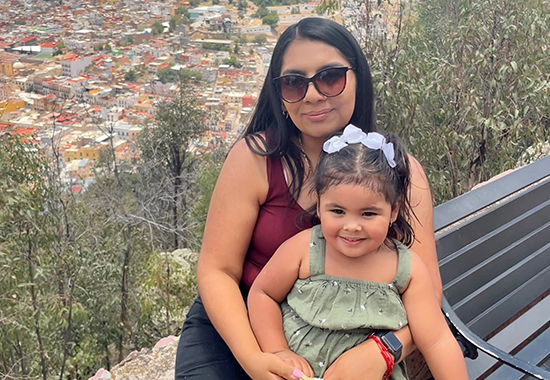
“I think seeing how much DSCC (the Division of Specialized Care for Children) helped my family made me want to do social work. I want to help people, and I want to make things better or try to find solutions to things.”
— Lisette Rios, current DSCC team member and former participant
“It’s more than simply providing information; it’s about building relationships.”
Lisette Rios’ career has truly brought her life full circle.
Born with a cleft lip, Lisette grew up receiving services from the University of Illinois Chicago’s Division of Specialized Care for Children (DSCC).
“I remember my mom talking on the phone a lot to my Care Coordinator, who would always ask how I was doing,” Lisette said.
DSCC helped the Rios family find medical specialists, discuss treatment options, coordinate surgeries and ensure Lisette and the family’s overall needs were met.
Now as a DSCC employee herself, Lisette is that helping hand and voice of comfort for other families like hers.
“My mom likes to say it’s a full circle for me. It was meant to be,” she said.
True to her dream
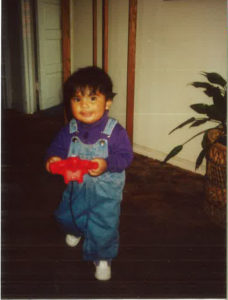
Lisette as a toddler.
For as far back as Lisette can remember, DSCC was a part of her life. Shortly after her birth, her pediatrician referred the Rios family to DSCC.
“I think my parents were probably very overwhelmed. I was the firstborn and there were a lot of issues, and they didn’t know what was going to happen. The fact that my pediatrician told them about DSCC helped a lot,” she said.
Lisette required at least eight surgeries throughout her childhood until age 12. She particularly remembers DSCC helping her family navigate her orthodontics issues and finding a specialist who could address them.
The family’s Care Coordinator would also check in about Lisette and her goals for the future. Around age 12, she decided she wanted to become a social worker.
“My mom told my Care Coordinator that, and my coordinator said, ‘Maybe she can come work with us,’” Lisette recalled. “After I got my internship, I joked with my mom that I’m coming for this position I was promised.”
Lisette stayed true to her dream.
After high school graduation, she double majored in sociology and criminology at UIC. When it was time to look for internships, she reached out to DSCC.
Lisette started an internship in the Chicago Core Regional Office during the fall 2018 semester.
“I think seeing how much DSCC helped my family made me want to do social work. I want to help people, and I want to make things better or try to find solutions to things,” Lisette said.
“You’re already dealing with so much when you have a child born with a health condition. It’s already a lot of emotions for the family and then to try to figure everything out on your own – that’s a lot. I want to be on the other side trying to reassure families and help them.”
Part of the DSCC team
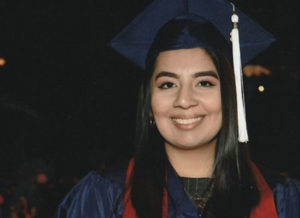
Lisette at her college graduation.
Lisette called her DSCC internship a wonderful experience. She learned how to read medical reports and the steps necessary for families to apply for DSCC’s assistance. She also learned how to communicate with families and help them identify their needs.
After her internship ended, Lisette graduated in December 2018. Since DSCC had no job openings at the time, she looked elsewhere for employment.
A few months later, a job in our Chicago Core Office became available. Lisette applied and in August 2019, DSCC hired her as a full-time Program Coordinator Assistant (PCA).
In this role, she makes sure families complete the necessary paperwork for DSCC to communicate with their providers, provide financial assistance and so on. She also takes calls from families about any needs or problems that arise.
Three years into her full-time role at DSCC, Lisette continues to learn and deepen her passion for helping others.
“I’ve started working on my master’s and really love working with our families,” she said. “Getting to know our families and how they all approach things a little differently has been very gratifying. Having a child with special healthcare needs can be scary and overwhelming. I have gained so much respect for our families and all that they do.”
Lisette is proud to be part of the DSCC team that is helping families navigate so much more than just health care and all the appointments.
“There are many pieces that need to come together,” Lisette emphasized. “Kids are also transitioning to school, finishing school and aging out. At every stage, parents may have to adjust and learn a whole new routine or list of things. I’m really thankful that I can provide encouragement and help ensure that our families don’t have to figure it all out alone.”
Building relationships
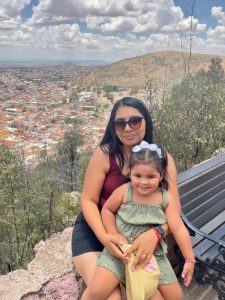
Lisette and her daughter, Eva.
Lisette’s experiences with DSCC have not just helped her grow professionally. Now as a mom to a young daughter with specialized needs of her own, Lisette is drawing on what she’s learned from working with other families.
“I recently had an Individualized Education Program (IEP) meeting for my 3-year-old daughter who will be starting pre-school. I’ve been thinking a lot since then about how I know the process and it was still stressful,” Lisette said. “I just keep thinking about how intimidating the IEP meeting could be for someone who doesn’t have any background or information and how education is just one of the areas that parents are trying to navigate for their child.”
Lisette also understands how difficult it can be to ask for help.
“It’s not always easy to let someone know that you need help,” Lisette said. “I really appreciate our families and their ability to share and let us know that they need assistance. It’s more than simply providing information; it’s about building relationships. It’s like we’re being adopted into their family.”
Willa’s Family Story
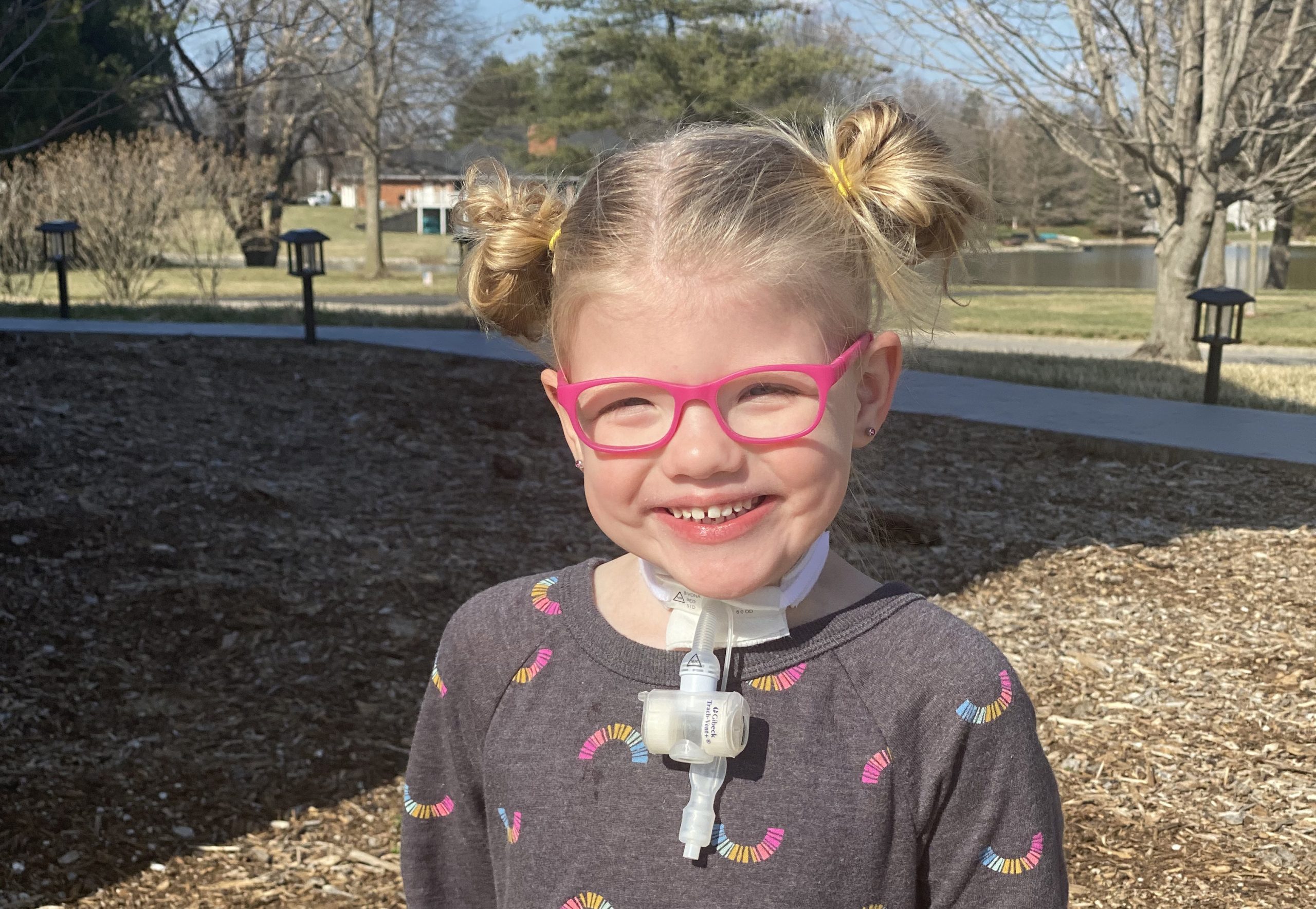
“It’s been an incredibly positive experience working with (the Division of Specialized Care for Children), and I’ve gained even more of an understanding that I’m not alone.”
— Whitney, mom of Willa in the Home Care Program
“Don’t be afraid to take advantage of the resources and supports that are out there”
Willa is a 4-year-old “tiny tornado” with an iron will, her family says.
This strong will earned her the nickname “Wonder Willa.” It also keeps her family entertained and hopeful through the uncertainty of her rare medical condition.
Willa was born with Congenital Central Hypoventilation Syndrome (CCHS), a lifelong and life-threatening genetic disorder that affects her breathing and nervous system.
Willa’s mom, Whitney, said there are only about 1,400 to 1,500 people in the world with a CCHS diagnosis.
“No single person with CCHS presents the same way,” she said. “So, it’s really hard to come up with a plan of care.”
Whitney is grateful for Willa’s amazing medical team and the support of the University of Illinois Chicago’s Division of Specialized Care for Children (DSCC) to help Willa continue to grow and thrive amid the unknowns.
A tough pill to swallow
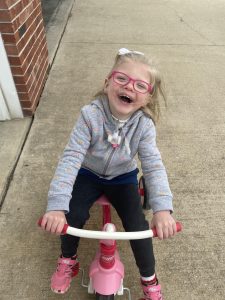 Being born prematurely is often not ideal. But Willa’s arrival six weeks early turned out to be a blessing, Whitney said.
Being born prematurely is often not ideal. But Willa’s arrival six weeks early turned out to be a blessing, Whitney said.
When Willa was born, her family and doctors did not know she had CCHS. They simply wanted to monitor her still-developing lungs.
“In most cases of her condition, it doesn’t present itself right away so we were lucky that she was early because she didn’t really start showing danger signs until 3 days old,” Whitney said.
“For Willa, her respiratory tract is only impacted by her condition when she’s sleeping. When she’s awake, she breathes just like you and I do. But once she falls asleep, her brain doesn’t tell her body to breathe. It doesn’t register the CO2 changes and she goes into CO2 narcosis. Her organs then shut down to protect her from that buildup of CO2 in her body.”
Three days after birth, Willa went into CO2 narcosis. Fortunately, doctors made the call to quickly transfer her to Cardinal Glennon Hospital in St. Louis before irreversible damage occurred.
A month later, genetic tests confirmed her CCHS diagnosis.
“Once we got the official diagnosis, we focused on what does treatment look like and how do we ensure she has the best life she can have,” Whitney said.
Willa’s medical team soon recommended placing a tracheostomy in Willa’s neck so she can breathe through a mechanical ventilator while she sleeps.
“It was not an easy pill for my husband or me to swallow when the pulmonary team wanted to put a trach in,” Whitney recalled. “But it was what needed to be done to keep her healthy and safe.”
“I’m not alone”
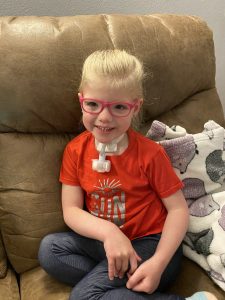 Willa received her trach at 2 months old. She arrived home more than two months later and has received in-home nursing through the Home Care Program ever since.
Willa received her trach at 2 months old. She arrived home more than two months later and has received in-home nursing through the Home Care Program ever since.
DSCC operates the Home Care Program on behalf of the Illinois Department of Healthcare and Family Services (HFS). The program provides in-home nursing and other support to help families safely care for their children with complex medical needs.
Whitney said the in-home nursing support is invaluable.
Willa’s nervous system can’t regulate, so if she’s playing hard or gets overexcited, her body won’t tell her to breathe. Therefore, Willa needs constant monitoring.
“But if you didn’t know about her condition, you’d have no idea that there’s anything going on with her except for the fact she has a trach,” Whitney said. “She is just your normal, crazy 4-and-a-half-year-old. She is a tiny tornado who loves to terrorize her older sister.”
As Willa grows, Whitney remains a strong advocate not only for her daughter but also for other families of children with special healthcare needs.
She joined DSCC’s Family Advisory Council (FAC) in 2021 and soon volunteered to serve as its advocacy chair.
Whitney appreciates the opportunity to connect with other families and share what she’s learned.
“It’s been an incredibly positive experience working with (DSCC), and I’ve gained even more of an understanding that I’m not alone. Being a medical mom and a medical parent is often very isolating. My husband and I know what each other is going through and what we face on a daily basis (with their daughters) but our friends or outside people don’t really get it,” she said. “(The council) has opened my circle.”
Improving services for families
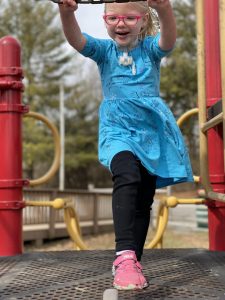 Whitney is also passionate about helping improve how the Home Care Program serves families. In particular, she wants to help families better understand the process for how HFS assigns in-home nursing allocations for each Home Care participant.
Whitney is also passionate about helping improve how the Home Care Program serves families. In particular, she wants to help families better understand the process for how HFS assigns in-home nursing allocations for each Home Care participant.
She also wants to help HFS understand the unique needs and circumstances of families like hers when deciding nursing allocations.
As part of her FAC service, Whitey hopes to speak with families across the state to learn about their experiences with nursing allocations and the appeal process.
“I want to hear their experiences so I can make a more well-rounded recommendation for changes,” she said.
Illinois families can email Whitney directly with feedback at w.woodring25@gmail.com.
Whitney also wants to use her role with DSCC’s FAC to educate families about existing resources and encourage them to use them.
“There can be a stigma associated with accepting help but don’t be afraid to take advantage of the resources and supports that are out there,” she said.
Visit our Family Advisory Council page to learn more about the FAC and how to get involved.
The Stearns Family
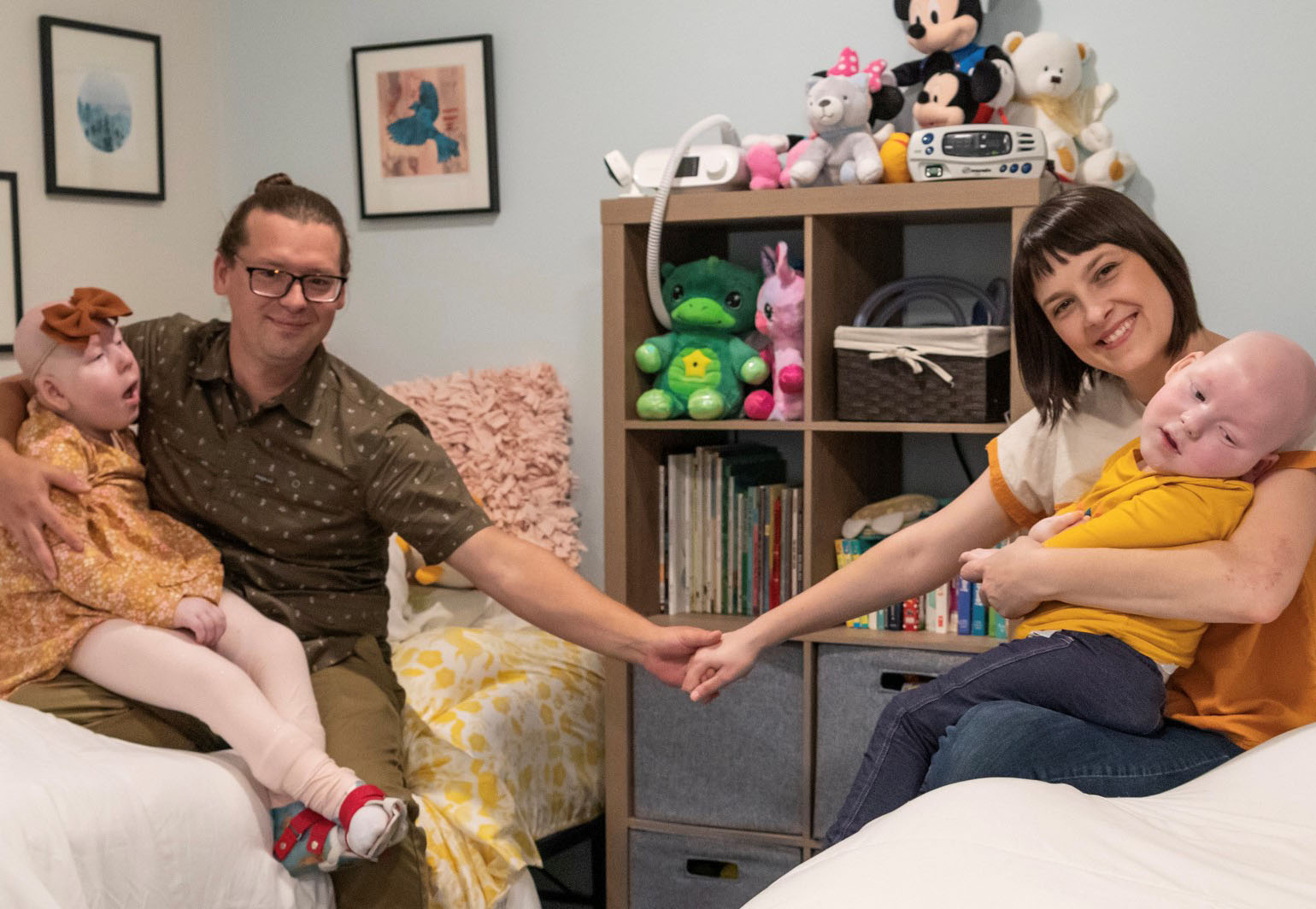
“(The Division of Specialized Care for Children) was one of the first organizations to step into our lives. They were some of the first social workers who came into our home and really began helping us to navigate our new lives with a medically complex child.”
— Erica Stearns, mother of Margot and Caratacus
“DSCC has played a tremendous role in helping our family to thrive”
Before Erica Stearns became the proud mother of two children with complex medical needs, she grew up with disabilities herself.
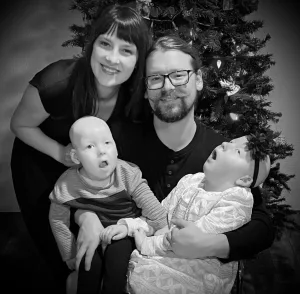
Erica was born with non-isolated tracheoesophageal fistula (also called TE fistula), as well as esophageal atresia, which resulted in permanent vocal cord paralysis. These conditions made her unable to breathe on her own or speak for the first part of her life.
Throughout her early childhood, Erica needed a gastrostomy tube (g-tube) to eat. She also depended on a tracheostomy tube (trach) to breathe until she was a teenager.
Erica unexpectedly found herself on the other side of complex caregiving when her daughter and son were born with a rare disease. Her children now depend on the same life-saving technology she needed as a child.
Though this world was familiar to Erica, there were still many unknowns, fears and intense emotions as she became both a mom and caregiver for her children’s profound disabilities and medical needs.
With support from the Division of Specialized Care for Children (DSCC) and finding community with other caregivers, Erica has developed a strong sense of purpose and empowerment.
She is the co-chair of DSCC’s Family Advisory Council. She is also DSCC’s new Home Care Family Outreach Associate.
In these roles, Erica uses her lived experiences to connect with other families and caregivers, raise awareness of their needs and find solutions to their challenges. These efforts are helping improve the quality of life for both her own children and all Illinois youth with complex medical needs and their families.
“Helping us to navigate our new lives”
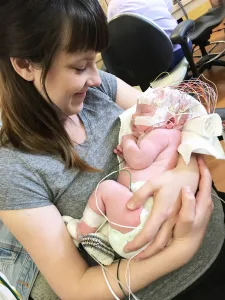 Erica’s children Margot, 7, and Caratacus, 5, were both born with the same rare genetic mutation, lanosterol synthase (LSS), which causes congenital atrichia (alopecia), brain abnormalities, and profound intellectual and physical disabilities.
Erica’s children Margot, 7, and Caratacus, 5, were both born with the same rare genetic mutation, lanosterol synthase (LSS), which causes congenital atrichia (alopecia), brain abnormalities, and profound intellectual and physical disabilities.
Erica and her husband were not prepared for either diagnosis.
“I felt like an outsider, unable to experience the ‘texbook’ parenthood that I had imagined. Even though the medical professionals referred to me as ‘mama’ and reassured me of my expertise on my child, I was overwhelmed by a creeping uncertainty, a gnawing doubt that I might never get to bring our child home with us,” Erica wrote about Margot’s birth and the days that followed.
“My journey was that of a medically complex caregiver, an advocate, a defender, a protector, and, above all else, a very tired mother. Becoming a caregiver to not one, but eventually two children with a rare and medically complex disease, meant that I had to quickly navigate the overwhelming world of medicine, genetic research, advocacy, and all the acronyms that come with this lifestyle.”
Margot and Caratacus both need in-home nursing to safely live at home. They became enrolled in the Home Care Program shortly after birth.
DSCC operates the Home Care Program on behalf of the Illinois Department of Healthcare and Family Services.
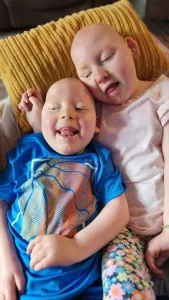
“DSCC was one of the first organizations to step into our lives. They were some of the first social workers who came into our home and began helping us to navigate our new lives with a medically complex child,” Erica said.
This support included connecting the Stearns family with available services and benefits to meet Margot and Caratacus’ complex needs.
Margot and Caratacus both qualify for the Home and Community-Based Services Waiver for Those Who are Medically Fragile and Technology-Dependent (MFTD).
Their DSCC Care Coordinator helped the Stearns family use the MFTD waiver to pay for modifications to make their van accessible for Margot and Caratacus’ wheelchairs and equipment.
The van modification helped the Stearns family take their first family road trip to Kansas to visit family over the summer of 2023. They also got to enjoy an adventure to the Kansas City Aquarium with their medically complex friends and the spending time University of Kansas natural history museum with their cousins.
“DSCC has played a tremendous role in helping our family not just to survive, but to thrive! They helped to provide the means for us to care for our children at home rather than in a hospital or an institution and they have supported us emotionally throughout every step of this journey,” Erica said.
“They are the people who we can guarantee to check in on us regularly, understand our children’s history, tell us about a resource or a charity that might benefit our children, and follow up with us following important events. Our Care Coordinator goes above by sending birthday cards to each of the kids, which I just can’t express it enough how touching and heartwarming that singular gesture is. She is the only person to ever do that for our kids.”
“A safe space” for concerns and input
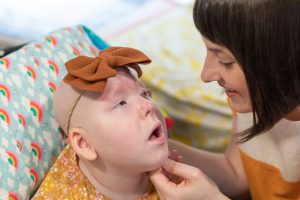
In 2021, Erica became involved with DSCC’s Family Advisory Council (FAC). The council connects families to resources and provides guidance to strengthen DSCC’s teamwork, improve communication and empower families to have a voice in their child’s care.
Erica soon volunteered to chair the council and now serves as co-chair. She said she enjoys the unique opportunity to learn about and discuss current initiatives related to supporting families of children with special healthcare needs.
“All too often, families like our own feel as though many decisions are made without our knowledge or input, which ultimately impacts our children and our family as a whole. The DSCC Family Advisory Council is a safe space where our concerns and our input are not only valued and requested but also received with respect and genuine consideration,” she said.
Erica also appreciates the opportunity to network with other families from across the state and partner with professionals as well. This collaboration helps lead to supportive solutions for families throughout Illinois.
“It brings me immense comfort to know, and be a part of, a team of people who place the family perspective at the center of their discussions and decisions,” she said.
Home Care Family Outreach Associate Role
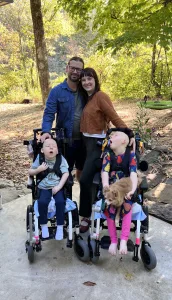
In 2023, Erica began to work for DSCC as our first Home Care Family Outreach Associate.
In this role, Erica works side-by-side with Home Care Program families and caregivers. She provides support by acknowledging shared experiences and helps guide them through the complex systems involved in their child’s care.
Erica also works to create a sense of community for caregivers within DSCC where families feel supported and empowered to navigate caregiving confidently.
“Empowered caregivers, in turn, create a positive ripple effect within their families and their communities,” Erica said.
Visit our Home Care Family Outreach page to learn more about this important role. You can also check out Erica’s HCFOA spotlight video below.
Learn more about Erica and her family
Erica is also the co-creator, host and author at Caffeinated Caregivers. You can read more about her parenthood and caregiving journey in this powerful blog post, “From Battlegrounds to Bridges: My Journey as a Medically Complex Caregiver.”
Erica also started a podcast called “Atypical Truth.” The podcast focuses on issues affecting caregivers, individuals with disabilities and individuals with complex medical conditions. One podcast episode highlights DSCC Care Coordinator Amanda Kaufman, who previously worked closely with the Stearns family.



